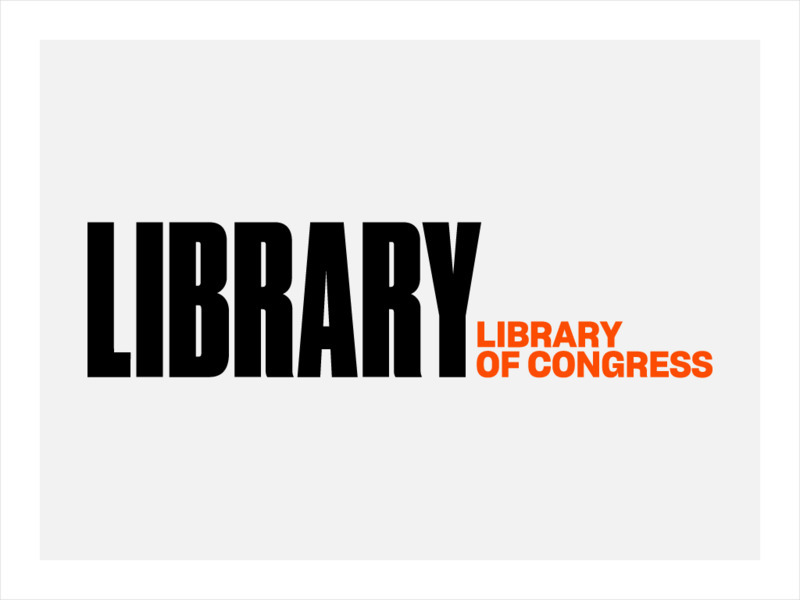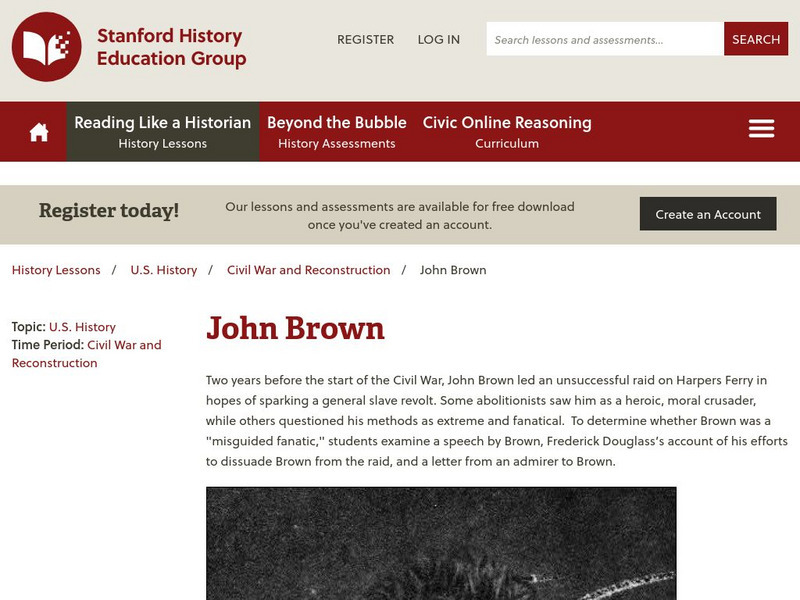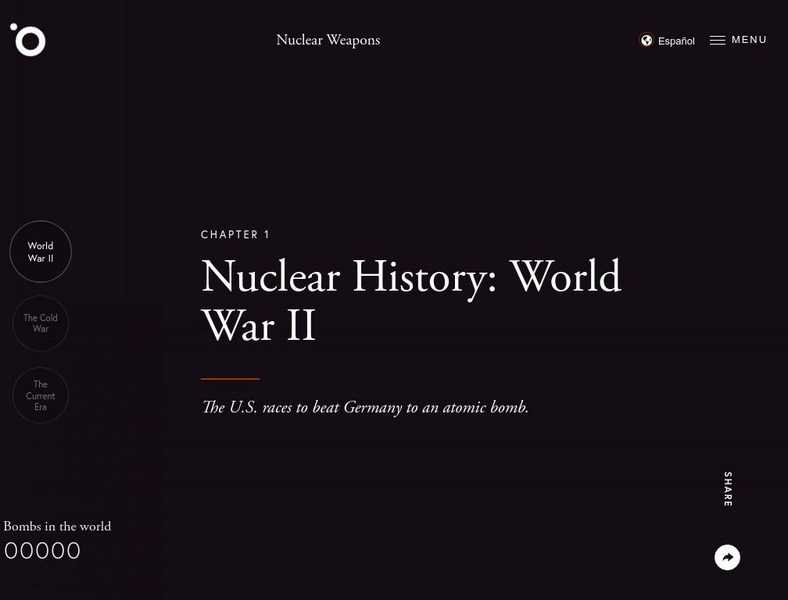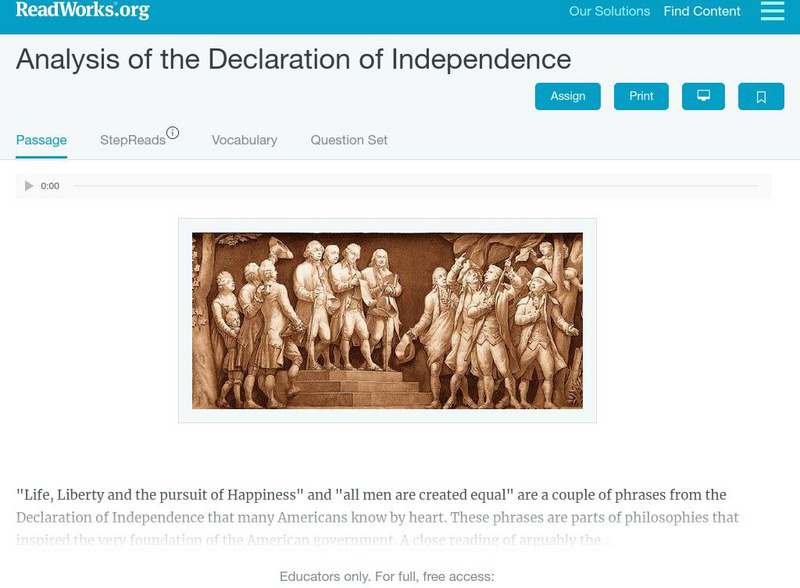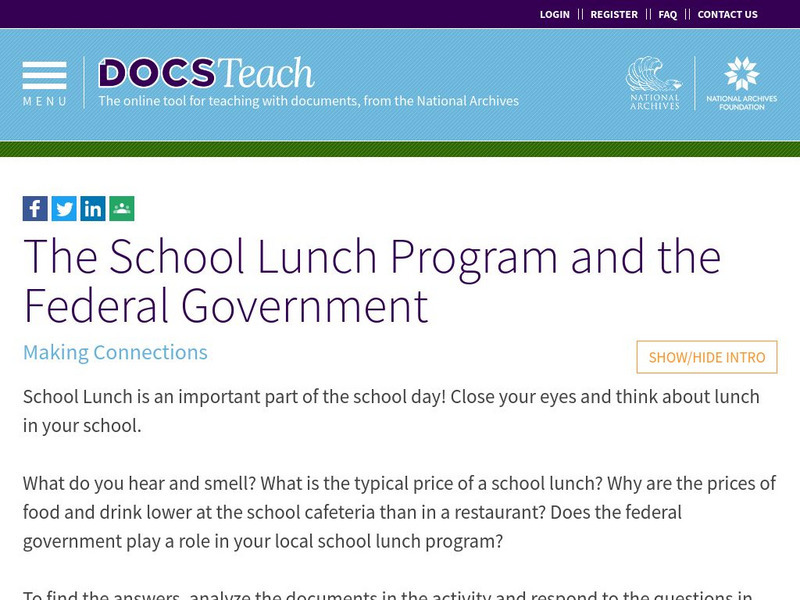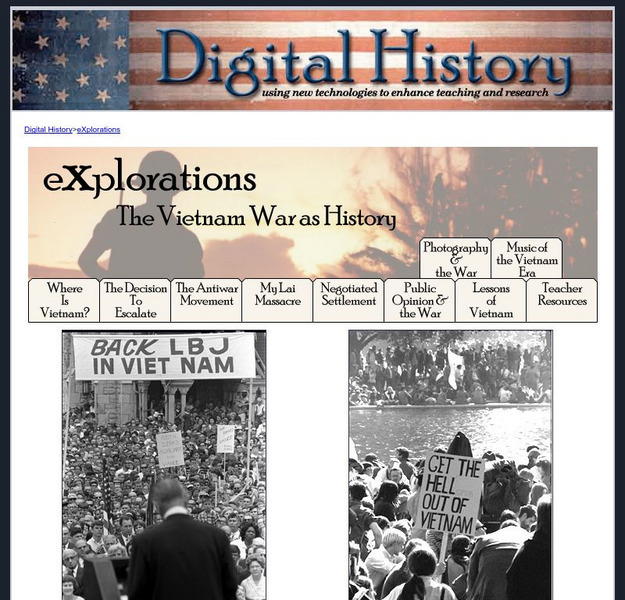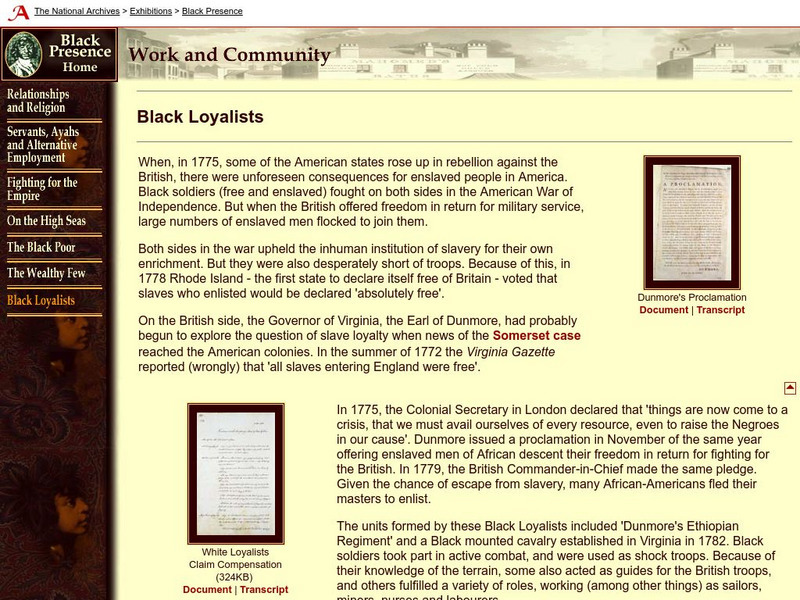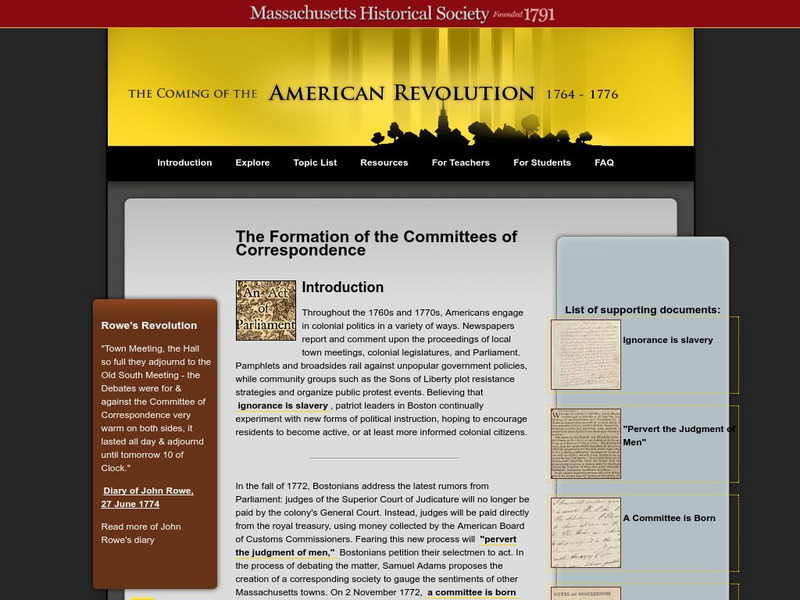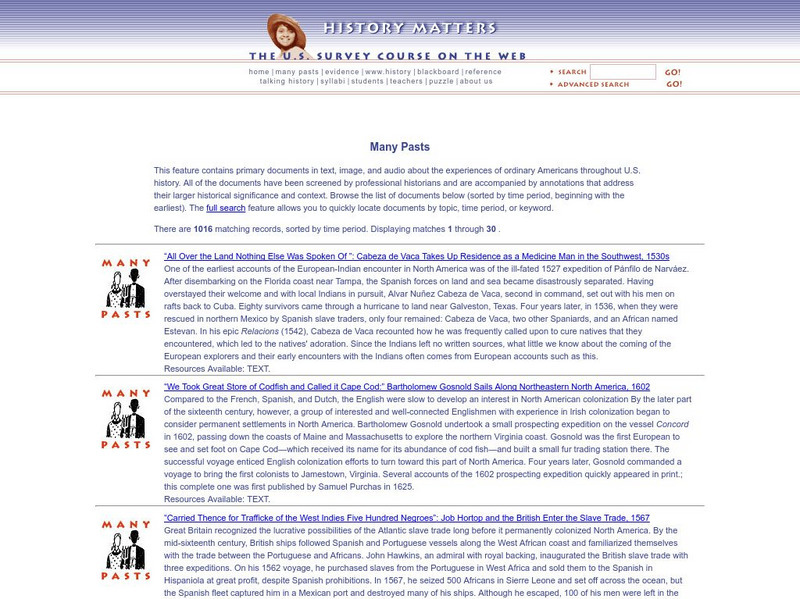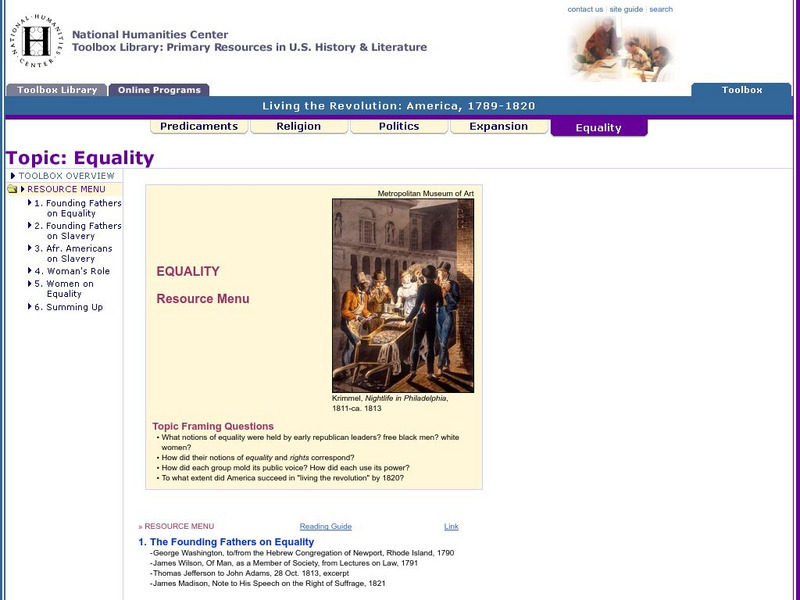College Board
Evaluating Sources: How Credible Are They?
How can learners evaluate research sources for authority, accuracy, and credibility? By completing readings, discussions, and graphic organizers, scholars learn how to properly evaluate sources to find credible information. Additionally,...
Internet History Sourcebooks Project
Fordham University: Medieval Sourcebook: History Through Primary Sources
This site from the Medieval Sourcebook answers the question: Why Study History Through Primary Sources? It provides complete information, a list of review questions, and bibliography information.
Library of Congress
Loc: History Firsthand: Primary Source Research
History Firsthand has been designed to provide elementary children with experiences which enable them to begin understanding primary sources. Students move from personal artifacts to the vast American Memory collections and learn how...
Library of Congress
Loc: Teachers: Personal Stories and Primary Sources
Students will explore the value of personal stories and first-hand accounts when exploring history, in this case, the events of the early twentieth century, which included World War I and the Great Depression. Through this five-unit...
Brigham Young University
Euro Docs: Online Sources for European History
Connect to primary source documents (facsimiles. transcriptions, translations) that trace the history of Europe.
Library of Congress
Loc: Her Story
A rich Library of Congress resource page that is filled with links to historical and primary documents offering a female perspective throughout history. Lesson plan links are also given.
Stanford University
Sheg: Document Based History: Reading Like a Historian: Albert Parsons Sac
[Free Registration/Login Required] Students use primary source documents to investigate central historical questions. In this investigation, students read six different sources that provide insight into what happened at Haymarket Square...
Stanford University
Sheg: Document Based History: Reading Like a Historian: John Brown
[Free Registration/Login Required] Students use primary source documents to investigate central historical questions. In this investigation, students must determine whether John Brown was a "misguided fanatic," by examining a speech by...
Stanford University
Sheg: Document Based History: Reading Like a Historian: Sedition in World War I
[Free Registration/Login Required] Students read primary source documents to solve a problem surrounding a historical question. This document-based inquiry lesson allows students to read anti-war literature from World War I critics to...
Library of Congress
Loc: American Treasures: Benjamin Franklin: In His Own Words
Learn about the life and contributions of Benjamin Franklin by examining his letters, books, cartoons, speeches, and manuscripts. An excellent resource for teaching and learning about the history of the United States using primary source...
National Humanities Center
National Humanities Center: America in Class: America in the 1920s: The Age
The National Humanities Center presents collections of primary resources compatible with the Common Core State Standards - historical documents, literary texts, and works of art - thematically organized with notes and discussion...
Other
Outrider: Nuclear History: World War Ii
A timeline with primary source documents and photos of the invention and use of the atomic bomb during World War II. Links to additional information and videos are also provided.
Read Works
Read Works: Analysis of the Declaration of Independence
[Free Registration/Login Required] This ReadWorks passage provides a brief analysis of the Declaration of Independence. A paired passage, a lower level passage with related content, a questions sheet, and an additional answer sheet are...
US National Archives
Docsteach: The School Lunch Program and the Federal Government
Students will draw upon the visual and textual data presented in photographs and documents to gain an understanding of how the federal school lunch program is a direct result of the Great Depression, how it became a permanent part of the...
US National Archives
National Archives: The Legislative Process
Learners will follow the legislative process for how a bill becomes a law by analyzing primary source documents. Included are worksheets that include a chart to be filled out in small groups, worksheets, materials, and an answer key....
University of Nebraska
University of Nebraska Lincoln: Railroads and the Making of Modern America
Jump aboard to examine the importance of railroads during the Civil War. Delve into primary source documents that show how the newly developed rail system played a strategic role in many battles and also examine the role of slave labor...
US National Archives
National Archives: Congress and Bill of Rights in History and Today
Students will understand the origin of the Bill of Rights by studying primary sources tracing the development of these amendments. Students will gain an understanding of basic rights and discuss possible additions to the Bill of Rights...
Digital History
Digital History: Explorations: The Vietnam War as History
Comprehensive interactive learning module explores the Vietnam War and includes maps, a timeline of important events, primary source documents, photographs, personal accounts, music, and teacher resources.
National Archives (UK)
The National Archives: Black Loyalists
Both free and enslaved black soldiers fought on both sides fo the Revolutionary War. Learn about the Black Loyalists of Canada, and how some slaves earned their freedom through military service. Includes primary source documents.
Massachusetts Historical Society
Mhs: Coming of the American Revolution: Committees of Correspondence
Discusses the formation of the committees of correspondence movement starting with the first one in Boston in 1772. Includes supporting primary source documents and great resources for teachers including lesson plans.
Curated OER
History Matters: Many Pasts
These primary source documents are about ordinary Americans throughout US history. There is a full search feature. All the historical documents, whether they are text, image, or audio, have been vetted by a historian. They are initially...
National Humanities Center
National Humanities Center: Toolbox Library: Living the Revolution: Expansion
Primary source documents on westward expansion convey the impact expanison had on national unity and provides a sense of interactions with Native Americans. Includes reading guide, links to supplemental material, and questions for...
National Humanities Center
National Humanities Center: Toolbox Library: Living the Revolution: 1789 1820: Equality
Primary source documents on equality provides a look into various perspectives surrounding the discussion on rights for slaves, African Americans, women and equality in general between 1789-1920. Includes questions for discussion,...
Library of Congress
Loc: Chinese Immigration to the United States, 1851 1900
Through the use of primary source documents, learn about Chinese immigration in the late 19th century and what led to the passing of the Chinese Exclusion Act.


